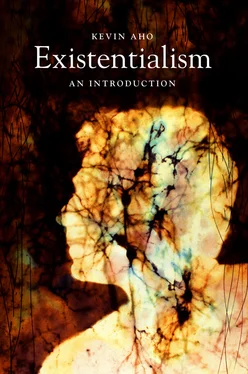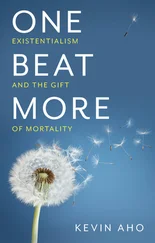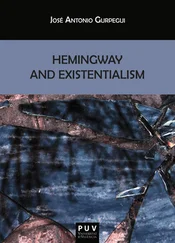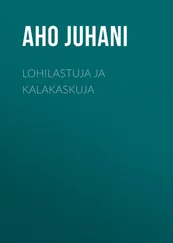But Beauvoir goes on to point out that simply because our projects are ambiguous and futile does not mean they are meaningless. “The notion of ambiguity must not be confused with that of absurdity,” she writes. “To declare that existence is absurd is to deny that it can ever be given a meaning; to say that it is ambiguous is to assert that its meaning is never fixed” (129). What Beauvoir is suggesting is that when we accept our structural ambiguity rather than fleeing from it, we can begin to focus on what we actually do in the world rather than trying to be something, because we now realize we can't be anything . This is why, in Notebooks for an Ethics , Sartre writes, “Authenticity reveals that the only meaningful project is that of doing (not that of being). … So, originally, authenticity consists in refusing any quest for being, because I am always nothing ” (Sartre 1992, 475; see Carman 2009, 239).
But in emphasizing how meanings are constituted through our actions in the world, existentialists now have to confront the ethical question: ‘How are we supposed to act?’ Without moral absolutes to guide us, can we do whatever we like as long as we are passionate, resolute, and clear-sighted about our ambiguity? Is it true, as Sartre asks, that “if God does not exist, [then] everything would be possible?” (2001, 296). From the preceding discussion, there appear to be no intimations of an ethics in existentialism. Kierkegaard calls for a ‘suspension of the ethical’; Nietzsche is committed to going ‘beyond good and evil’; Heidegger's account of ‘being-toward-death’ tells us nothing about what it means to be a good person; and Sartre makes it clear that there are “no values or commands to turn to which legitimize our conduct. … We are alone with no excuses” (2001, 296). Indeed, by privileging authenticity (‘ being true to oneself ’) over ethics (‘ doing what is right ’), it appears that the authentic individual could be a murderer just as easily as he or she could be a saint. And given Heidegger's own commitment to Nazism and Sartre's interests in Maoism, the question of whether or not existentialism has an ethics is a serious one for critics. The question of ethics also gives us an opportunity to explore heterodox conceptions of authenticity offered by some religious existentialists. For figures like Buber and Levinas, authenticity has little to do with being true to oneself because this puts too much emphasis on the individual. The aim, rather, is to see how we are morally responsible for and mutually dependent on others and bound up with something ‘higher’ than ourselves. We can now turn our attention to the relationship between existentialism and ethics as it framed by both secular and religious existentialists.
Suggested reading
Carman, T. (2009). The concept of authenticity. In H. Dreyfus and M. Wrathall (eds.), A companion to existentialism and phenomenology (pp. 229–239). Oxford: Blackwell.
Guignon, C. B. (2004a). On being authentic . London: Routledge.
Nehemas, A. (1985). Nietzsche: Life as literature . Cambridge, MA: Harvard University Press.
Taylor, C. (1991). The ethics of authenticity . Cambridge, MA: Harvard University Press.
Existentialists have long been criticized for their rejection of moral absolutes and emphasis on individual freedom because such a position appears to undermine the possibility for ethics. If ‘God is dead’ and there are no binding moral principles that we can turn to in order to guide and evaluate our actions, then existentialists seem to be espousing an ‘anything goes’ view of morality. Although there are many examples in existentialist literature, from Dostoevsky's ax-wielding Raskolnikov in Crime and Punishment to the vicious trio of Garcin, Estelle, and Inez in Sartre's No Exit , the work cited most often by critics as representative of existentialism's amorality is Camus's The Stranger . In this work, the reader is introduced to Mersault, the alienated anti-hero who appears to be the incarnation of moral nihilism. For him, “nothing, nothing had the least importance” (1946, 152). The story begins with the death of his mother, an event that Mersault is completely unaffected by. “It occurred to me,” he writes, “that somehow I'd got through another Sunday, that Mother now was buried, and tomorrow I'd be going back to work as usual. Really, nothing in my life had changed” (30). Later, his girlfriend asks if he loves her, and he replies with total indifference: “Much as before, her question meant nothing or next to nothing” (52). The story reaches its climax when he and some friends confront two men on the beach, a fight breaks out, and Mersault later shoots and kills one of them. What is brought into stark relief in the description of the event is how Mersault is completely free and disconnected from any moral principles. He knows he can turn around and walk away from the conflict, but there is nothing that tells him he ‘ ought ’ to do it. At his trial, the prosecutor tries to understand his reasons for killing the man, and Mersault makes it clear that there was no reason. “Why had I taken the revolver with me, and why go back precisely to that spot? … [It] was a matter of pure chance ” (110, 116). What is especially irritating to the reader is Mersault's lack of contrition or remorse. The story ends with him facing execution by guillotine but accepting his situation and, in this acceptance, realizing “that [he'd] been happy, and … was happy still” (154).
The Stranger is criticized for its moral nihilism and for its apparent glorification of freedom over any considerations of moral conduct. But to use this story to characterize the ethical shortcomings of existentialism misses the mark. It is true that existentialists reject the idea of normative ethics that aim to provide universal prescriptions or norms for how we should act. In this sense, the standard Kantian view of ethics as rational self-legislation and duty to the ‘moral law’ and the utilitarian view of ethics based on the detached calculation of happiness are dismissed. There can be no normative ethics on the existentialist account because there is no justification, no ‘God's-eye view’ for these kinds of prescriptions. “My freedom,” says Sartre, “is the unique foundation of values, [and so] nothing, absolutely nothing justifies me in adopting this or that particular value [or] this or that particular scale of values” (1956, 38). Sartre goes on to claim that “one can choose anything” (2001, 307), that “man is a useless passion” (Sartre 1956, 784), and that “all human activities are equivalent. … It amounts to the same thing whether one gets drunk alone or is a leader of nations” (797). But such claims, taken in isolation, do not mean that existentialists are unconcerned with how we ought to live and treat others. The point is that human beings must own up to their freedom and, in doing so, take responsibility for what they do in the world. In this sense, freedom is not an abstract or formal concept; it is realized only through our concrete actions in the world. Beauvoir explains:
One of the chief objections leveled against existentialism is that the precept ‘to will freedom’ is only a hollow formula and offers no concrete content for action. But that is because one has begun by emptying the word freedom of its concrete meaning; we have already seen that freedom realizes itself only by engaging itself in the world: to such an extent that man's project toward freedom is embodied in him in definite acts of behavior. (1948, 78)
Читать дальше












